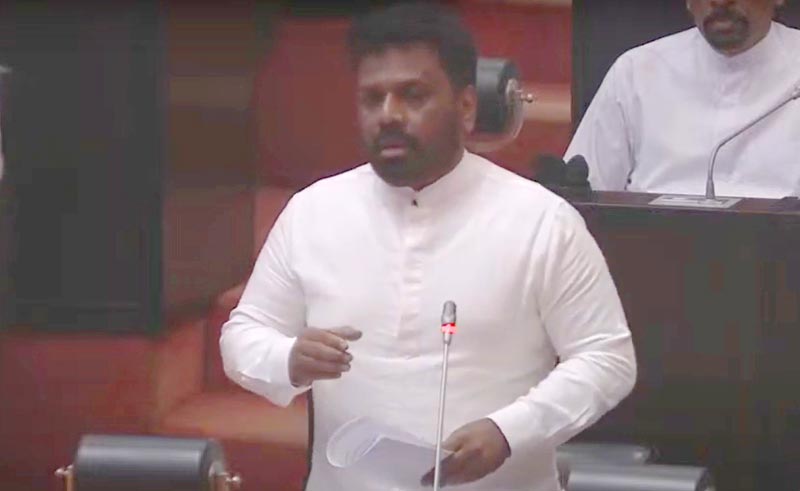Sunday Feb 22, 2026
Sunday Feb 22, 2026
Thursday, 19 December 2024 03:42 - - {{hitsCtrl.values.hits}}

President Anura Kumara Dissanayake
President Anura Kumara Dissanayake making a special statement in Parliament yesterday announced significant relief for professionals through adjustments to the Pay-As-You-Earn (PAYE) tax structure, as part of broader measures aimed at stabilising the economy.
Addressing Parliament, the President outlined tax reforms, social welfare measures, and strategies to bolster the country’s foreign exchange reserves and economic resilience.
The President revealed that dissatisfaction among professionals, including university academics, doctors, and bank officials, had prompted a revision of PAYE tax thresholds and rates.
He announced the Government will increase the tax-free threshold from Rs. 100,000 to Rs. 150,000 and extend the first Personal Income Tax (PIT) band of 6% from Rs. 600,000 to Rs. 1 million. As a result, persons earning a monthly income of Rs. 150,000 will pay no tax, while those earning Rs. 200,000, Rs. 250,000, Rs. 300,000, and Rs. 350,000 will benefit from exemptions of 71%, 61%, 47%, and 25.5% of their respective tax amounts.
This relief primarily targets lower-income earners while maintaining reduced benefits for higher-income groups to ensure fairness, the President said.
Meanwhile the withholding tax on deposit interest has been increased from 5% to 10% as announced by the President. “However, if any citizen believes they should not be subjected to this tax, they can approach the Inland Revenue Department (IRD) and present their case regarding their tax status. A dedicated unit will be established within the IRD to assist individuals in clarifying their tax obligations and ensuring exemptions where applicable,” he said.
The President also announced the exemption of yoghurt and other dairy products from Value Added Tax (VAT) to improve children’s nutritional standards. Additionally, the export service tax rate, previously set at 30%, has been reduced to 15%.
A phased reopening of the vehicle market was announced by President Dissanayake to rejuvenate associated industries and entrepreneurs. Imports will resume in three stages, starting with passenger transport buses and special-purpose vehicles, followed by private vehicles in February next year.
“The Central Bank has assured that the dollar allocations for these imports will not destabilise the economy,” the President said, addressing concerns about a potential dollar crisis.
The President expressed confidence in increasing Sri Lanka’s foreign exchange reserves to $ 15.1 billion by 2028, asserting: “This is not just an aspiration; it is a commitment.” He dismissed fears of another bankruptcy crisis, stating that the Government is working diligently to ensure economic stability.
The President also announced a monthly allowance of Rs. 6,000 for children from underprivileged schools to address financial hardships that hinder their education. Furthermore, the fertiliser subsidy for farmers has been increased to Rs. 25,000, with instructions for prompt distribution.
He announced that small and medium-sized enterprises (SMEs), which make up 99% of loan defaulters, will receive an extended grace period under the Parate law and loan restructuring deadlines have been extended to accommodate businesses with outstanding loans.
The President highlighted that the Government has successfully restructured $ 12.55 billion in debt, including $ 1.7 billion in defaulted debt. He emphasised that the previous administration was responsible for $ 11.5 billion of this debt, criticising the lack of timely advice and action during that period.
He noted that the Government has initiated discussions with the International Monetary Fund (IMF) for the third review, addressing preconditions agreed upon by the previous administration, such as the imposition of a property tax based on imputed income and the replacement of the Special Commodity Levy with VAT.
The President assured the public that his administration would not allow a repeat of the 2022-2023 crisis. “Under our leadership, Sri Lanka will never face bankruptcy again. By 2028, this Government will have achieved stability and resilience,” he affirmed.
The President also called for cooperation in amending the Aswesuma Act to ensure a more efficient distribution of welfare benefits. “We are addressing issues related to Aswesuma distribution and ensuring that those eligible but excluded from the scheme are included,” he said.